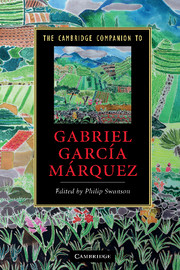Book contents
- Frontmatter
- Introduction
- 1 Gabriel García Márquez: life and times
- 2 The critical reception of García Márquez
- 3 Before One Hundred Years of Solitude: the early novels
- 4 One Hundred Years of Solitude
- 5 An eco-critical reading of One Hundred Years of Solitude
- 6 The Autumn of the Patriarch
- 7 The General in His Labyrinth
- 8 García Márquez’s novels of love
- 9 García Márquez’s short stories
- 10 García Márquez’s non-fiction works
- 11 García Márquez and film
- 12 García Márquez, magical realism and world literature
- Further reading
- Index
7 - The General in His Labyrinth
Published online by Cambridge University Press: 28 September 2010
- Frontmatter
- Introduction
- 1 Gabriel García Márquez: life and times
- 2 The critical reception of García Márquez
- 3 Before One Hundred Years of Solitude: the early novels
- 4 One Hundred Years of Solitude
- 5 An eco-critical reading of One Hundred Years of Solitude
- 6 The Autumn of the Patriarch
- 7 The General in His Labyrinth
- 8 García Márquez’s novels of love
- 9 García Márquez’s short stories
- 10 García Márquez’s non-fiction works
- 11 García Márquez and film
- 12 García Márquez, magical realism and world literature
- Further reading
- Index
Summary
Two central ideas guide this essay. Firstly, The General in His Labyrinth (El general en su laberinto [1989]), while not perhaps the most important of Gabriel García Márquez's novels, is nevertheless a culmination of his career as a writer, a kind of compact summa: not only because it is a literary biography of Latin America's greatest historical icon by a man himself unusually famous and always intrigued by failed heroes, but also because, typologically, it is the book which contains the largest number of different themes and trademark elements which may be identified, in variable degrees, in those other works by García Márquez that preceded and succeeded it. Second, death and burial are perhaps the most compelling and enduring of these central themes that shape García Márquez's writing, just as they shape life itself, and therefore it was particularly appropriate that the Colombian novelist should concentrate on the events leading up to the death of the Great Liberator after so successfully bringing him to life.
- Type
- Chapter
- Information
- The Cambridge Companion to Gabriel García Márquez , pp. 94 - 112Publisher: Cambridge University PressPrint publication year: 2010

